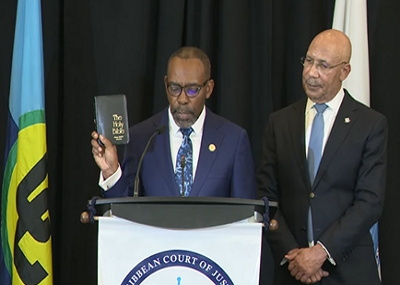
By Staff Writer
KINGSTON, Jamaica, Jul 6, CMC – Jamaican jurist, Winston Anderson, was sworn in as the fourth president of the Trinidad and Tobago-based Caribbean Court of Justice (CCJ), pledging to continue fulfilling the role for which it had been established 20 years ago and urging Caribbean countries to fully commit to the court.
Justice Anderson, who has been a judge with the CCJ for the past 15 years, took his oath before Jamaica’s Governor General, Sir Patrick Allen at a ceremony that was also attended by Prime Minister Andrew Holness, the new chairman of the 15-member Caribbean Community (CARICOM), the Belize Prime Minister, John Briceno, who has led responsibility lead responsibility within the CARICOM Quasi cabinet.
Also attending the ceremony were the CARICOM Secretary General, Dr. Carla Barnett, the outgoing CCJ President, Justice Adrian Saunders and Sir Dennis Byron, who served as the second president of the CCJ.
Justice Anderson, who also holds Barbadian citizenship, told the ceremony that he was accepting the new post with “humility and preparedness” and wanted to play a role in fostering “a Caribbean dream if we dare to dream and pursue it”.
Justice Anderson, who worked as the General Counsel of CARICOM on secondment from the University of the West Indies (UWI) where he taught at the Faculty of Law, said that his experience at CARICOM “reinforced that inseparable, from that Caribbean dream, is laying claim to our sovereignty.
“Beginning in the 1960’s we extracted our political independence from the United Kingdom. Forty years later the framers of the agreement establishing the CCJ deliberately intended the creation of an institution worthy of our judicial sovereignty.
Justice Anderson told the ceremony that sound and enduring arrangements were put in place to ensure the independence of the Court, including an autonomous RJLSC (Regional Judicial and Legal Services Commission) to appoint judges to the court and a trust fund managed by professionals to provide the resources necessary for the operation of the court.
“My 15 years at the Court has revealed its transformative potential. This year marks the 20th anniversary of that glorious April morning in 2005, when the CCJ moved from the parchment of an agreement into a living and functional institution.
“In those 20 years, the Court has served the people and states of this region with its full measure of devotion. It has produced hundreds of cases to guide conduct between and among member states.”
Justice Anderson said that these judgements have been examined in our courts and that ‘they comprise a record against which to measure the promise and performance of the Court.
“Most fundamentally, the decisions of the Court, have begun to shape the way that we, the Caribbean people live our lives and how we see ourselves, It has been an honour to contribute to that”,
But the new CCJ President said he wanted to reiterate that the Trinidad-based based court “was not imposed on us by anyone, rather it was conceived and established and is maintained by the people of the Caribbean to serve Caribbean interests”.
He said in both its Original and Appellate Jurisdictions, “the CCJ stands as a pillar of independence and a symbol of our collective maturity”.
Barbados, Belize, Guyana, Dominica and St. Lucia are the only signatories to the Appellate Jurisdiction while the rest of the majority of the CARICOM countries are members of the Original jurisdiction of the court that also serves as an international tribunal interpreting the Treaty of Chaguaramas that governs the regional integration movement.
He said it is worth noting that in its Appellate Jurisdiction, the CCJ has exerted reach and influence well beyond the five states that are signatories.
He said that as he assumes the highest office of the CCJ, he does so “not in isolation, but as part of a larger regional movement of national judiciaries dedicated to delivering accessible justice, ensuring respect for and advancing the rule of law, protecting and promoting human rights and supporting sustainable development of our countries”.
He said as members of the judiciaries, they share in the efforts to make the Caribbean the place of choice to live, work and raise families, do business and retire in peace and security.
He said it is also his intention to lead the CCJ in a manner “worthy of its origins and its calling,” adding that “after 20 years, the court has still not attracted full support of all eligible states for the Appellate jurisdiction with five out a possible 11 states, joining that jurisdiction.
“I am hopeful that during my tenure, other states will fulfill their treaty obligations and become full members of the appellate Jurisdiction,” he said to applause, adding “I am looking straight ahead as I utter those words,” a clear reference to Prime Minister Holness.
In his brief address to the ceremony, Holness said as the CCJ marks its 20th anniversary “this moment allows us to both honour its legacy and embrace a new chapter in our region’s judicial journey”.
Jamaica’s two main political parties are at odds over whether to fully join the CCJ that was established to replace the London-based Privy Council as the region’s highest and final court, with the ruling Jamaica Labour Party (JLP) indicating that referendum would be needed for Kingston to move fully to the court,
He told Justice Anderson that he was extending “warm and sincere congratulations” and that his appointment is a “moment of pride, not only for Jamaica but for the entire region”.
He said that even as the CCJ maximises the use of technology he would like for the court to intensify its iterant sittings “so that the people of the region can see, interact with us and realise in fact that we are their kith and kin and part and parcel of the fabric of their society”.
Justice Anderson, 65, is the father of three adult children one who is a lawyer and the other two, medical practitioners.
CMC/pr/ir/2025

